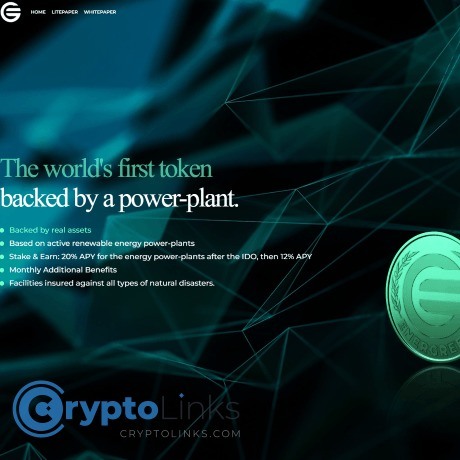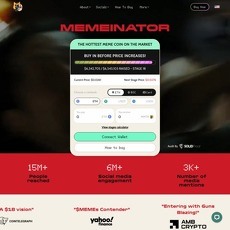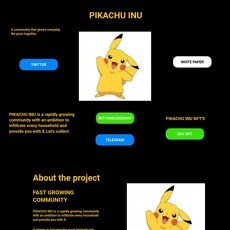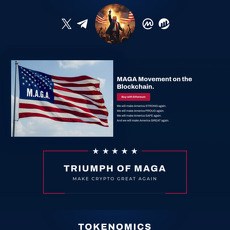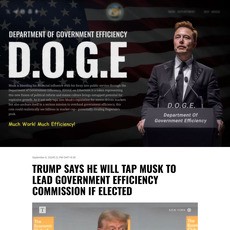Energreen Review
Energreen
energreen.io
If your website is on the scam list and you think that you are not a scammer, contact us. After you provide us with all the proof that you are in Crypto World with good intentions, we will delist you. Usually, you get in this category because you are hiding your team, you have a bad reputation(you are tricking, deceiving, scamming people), and you haven't got a written project whitepaper or is a shitty one....
Their Official site text:
EnerGreen
The world’s firs t token
backed by a power plant
Overview:
EnerGreen is the world’s first blockchain-based solution for investing in renewable
energy plants.
■ Backed by real assets
■ Based on currently operating renewable energy power-plants
■ Stake & Earn: (20% APY for the first 6 months after the Initial DEX Offering
(hereinafter “IDO”), then 12% APY)
■ Additional Benefits
■ Facilities insured against all types of natural disasters
Investors can take part in the EnerGreen project by purchasing tokens. Our energy
plants generate renewable energy which is subsequently converted into recurring
revenue. Investors who stake EnerGreen tokens (hereinafter “EGRN”) will earn 20%
APY for the first six months following the IDO, and 12% APY subsequently.
*In addition to yields from staking, additional benefits will be shared among the
EnerGreen stakers each month based on the tier system.
1. OVERVIEW OF THE ENERGY MARKET
1.1. Challenges imposed by climate change
According to a landmark United Nations report, which is of a turning point nature, it
has been found out that a paradigm shift is needed to limit the global temperature
increase below 1,5°C. Drought, heat waves, floods, and poverty will get worse over the
next 12 years, affecting millions all around the world if no action is taken.
The report emphasizes the need for quick-acting measures, now more than ever, that
will bring about swift change.
Yet, there is a problem: although the cost of renewable energy has been gradually
down and is projected to continue doing so, the ability of the majority of businesses
to benefit from this transition remains constrained. Financial tools that are designed
to make it possible for regular individuals and businesses to obtain renewable energy
under the right circumstances are still far from adequate.
1.2. Green Energy Economy
Environmental preservation and a reduction in carbon emissions are the first things
that come to mind when considering renewable energy. The cost of producing
electricity from renewable sources, however, has dropped and will continue to fall
below the cost of technologies based on fossil fuel, due to beneficial technological
breakthroughs and practical financial conveniences. Therefore, it is clear that
enhancing the use of renewable resources will be economically favorable and
sustainable, as shown in global trends and supported by data.
Currently, there are 753.10 MW Licensed and 6,682.10 MW Unlicensed Solar Electric
Utilities in Turkey, as reported by Turkish Electricity Transmission Corporation
(hereinafter “TEIAS”) in August 2021. It is anticipated that this number will offer a
minimum yearly growth of 1,500.00 MW through Renewable Energy Source Area
(YEKA) bids, unlicensed investments, hybrid power plants, and power boost requests.
With new and existing investments, the costs of producing energy at solar power
plants are variable. Feed-in Tariffs (FIT) of $0.133 per kWh are utilized by unlicensed
renewable energy installations. Based on the quarterly Electric Pricing Lists released
by EMRA (Energy Market Regulatory Authority), the distribution prices of power
plants are 0.022 USD per kilowatt-hour (kWh). Also, there are two unique options
for licensed investments: one involves sales at a price of 0.133 USD/kWh and the
payment of a license fee; and the other involves selling energy at a price of 0.069
USD/kWh under the YEKA tender without the payment of a license fee. Nearly all
of the licensed investments in this situation have either been completed or are in
progress.
Renewable Facilities in Turkey no longer require a government purchase guarantee
incentive, as is the case globally, and projects that can generate energy sales and
market realization are nearing completion. The Renewable Energy Source Area
tenders for Solar Power Plants (“SPP”) and Wind Power Plants (“WPP”) demonstrate
the emergence of projects that can sell energy while still fulfilling their amortizations
at rates significantly lower than the electricity prices on the free market. Furthermore,
as a result of the recent technological advances in energy storage systems, renewable
energy plants are among the best prospects to replace future peak power plants,
reduce line losses, and address network instabilities (voltage, frequency, and
reactance).
The threshold for switching to the Final Source Supply Price List was also lowered
in accordance with Turkey’s energy policy, first from 50 million kWh per year to 10
million kWh per year and then further to 3 million kWh per year in the final quarter
of 2021, following the principle of “consume more and pay more.” In other words, if a
facility uses more than 3 million kWh of electricity annually, it will not qualify for the
National Price List, which is less expensive, and instead will be charged according to
the Final Source Supply Price List, which is costlier in the Day-Ahead Market and DayIn Market conditions. In this perspective, generating renewable energy in locations
where demand is high has become a necessity rather than a lucrative investment for
many companies in the current competitive environment. While the cost of specific
equipment for Solar Power Plants (panels, inverters, etc.) is falling, efficiency is rising
as a result of technical innovations. Novel technologies are being developed to deliver
greater capacity in a smaller space and are quickly gaining traction in the market.
Specifically for Wind Power Plants, the entire machinery and equipment may
now be manufactured on Turkish soil, mitigating the current technology gap and
contributing to production through the energy collected from Turkey’s outstanding
wind potential. According to TEIAS data from August 2021, Turkey has 10,014.10 MW
Licensed and 70.8 MW Unlicensed Wind Power Plants, many of which will soon have
a Hybrid Plant configuration where the sun will serve as a backup supply in addition
to the wind as the primary source of energy. Additionally, it is envisaged that these
plants will be constructed as multi-source production facilities and energy storages.
Prior to the release of the new YEKDEM tariffs, the industry’s installed capacity for
Biomass Power Plants had just reached a substantial level. Energy prices for certified
biomass power plants are $0.013 per kilowatt-hour, while earnings from waste
disposal can account for up to 40% of their overall revenue. Turkey has 1,429.70 MW of
licensed biomass power plants and 85.90 MW of unlicensed biomass power plants, as
per the above-mentioned TEIAS data from August 2021.
The revenue forecast of these plants may incorporate multiple streams of revenue,
including waste disposal, energy generation, greenhouse development utilizing waste
heat, and fertilizer manufacturing. This type of investment, especially in our region,
has the most potential for reaching the sustainability and zero-carbon targets.
Given that they provide a variety of revenues and monetization alternatives,
these plants rank among the most desirable investments in terms of long-term
viability. Although the countries in the region have tremendous potential for waste
management, their current methods—such as the most often utilized landfills—are
barely sustainable, necessitating the development of integrated waste management
systems by both local and central authorities. Turkey will soon see the expansion of
integrated waste management and disposal plants, particularly in major cities like
Istanbul and Ankara, where the initial and main phase installations have already
been completed. This is due to the fact that both landfill facilities have lost their
operational appeal since their income from Renewable Energy Resources Support
Mechanism (“YEKDEM”) ceased (as the 10-year period expired); and because
environmental policies mandated by ratified international agreements made this
necessary. Implementation prices have diminished substantially and continue to fall
compared to the industry’s inception while more domestic production of machinery
and equipment has substituted imports. Moreover, engineering know-how has
evolved since the initial construction of facilities.
Consequently, the installation expenses of alternative production units such as
solar, wind, hydro, and bio-energy decrease, while their efficiency soars; whereas
the infrastructure costs of fossil-based power generation facilities keep rising
proportionally to the price of the raw materials on which they rely.
1.3. Ways to purchase clean energy
Due to the constantly declining cost of renewable energy, numerous organizations
now purchase their electricity directly from renewable energy projects under Power
Purchase Agreements (“PPA”). Throughout the past decade, the Corporate PPA
procurement approach has multiplied by 36.
Yet, corporate PPAs are technically and commercially complex and exist in a number
of forms, resulting in lengthy delivery periods and significant transaction costs.
Hence, this technique has benefited only huge firms. The two fundamental forms
of PPAs are the “standard” PPA, which allows the provider to supply energy to the
buyer, and the “virtual” PPA, which is a financial agreement based on the producer’s
power output without forcing the buyer to purchase electricity from the producer.
1.4. Transparency and Sustainability
In addition, the lack of openness in the energy sector inhibits small consumers from
negotiating directly with producers. Generally, a broker serves as a go-between,
purchasing power from the producer at a discount and reselling it to the end user
at a much higher rate, thereby benefitting enormously from a situation that is
unfavorable to both sides. The entire process is impenetrable to both customers and
producers, with only intermediaries having access to information. This commercial
framework is obviously unsustainable, and there is a significant market demand for
software and apps that enable real-time tracking of the generated electricity and
transparent, long-term allocation of customers’ purchasing power under bilateral
agreements.
2. ENERGREEN
2.1. Purpose:
Innovations in the energy sector are required as everyone needs access to climatefriendly, secure, and affordable energy sources. The transition to renewable energies
for the sake of progressive digitalization represents a huge opportunity to challenge
the status quo. To yet, it’s been exceedingly difficult for individuals or private
households to have a significant impact on the energy market’s convoluted and
opaque structure.
This is where blockchain technology enters the picture: it redesigns the entire
process while promoting further decentralization and democratization of the power
supply. EnerGreen wishes to develop a blockchain-based initiative to enable everyone
to take part in the production of clean energy from wind turbines, solar panels, and
biomass installations; allowing individuals to join the venture on the basis of a coownership model, as embodied by blockchain technology.
We believe that individuals desire to be at the forefront of the energy revolution
while also financially benefit from it. Nonetheless, authorities and current market
arrangements typically retain higher starting figures. In contrast, as users’ faith in
large companies wanes, they tend to make bolder claims about taking a greater
initiative. EnerGreen’s blockchain ecosystem has been designed with this objective in
mind, making it simpler for anyone to participate in and profit from the green energy
revolution.
2.2. Paris Agreement:
The agreement seeks to limit the long-term increase in global temperature brought
on by human-caused greenhouse gas emissions to 2 degrees Celsius over preindustrial levels, while highlighting the benefit of achieving the more challenging
but preferable target of 1.5 degrees. The Paris Climate Agreement also states that
countries’ contributions to the effort to combat climate change should be based on
the concept of “common but differentiated responsibilities and relative abilities.”
EnerGreen utilizes carbon-neutral alternative energy production techniques in an
effort to support the Paris Climate Agreement.
2.3. EnerGreen:
Climate change is one of the world’s most pressing challenges, which EnerGreen
strives to address. EnerGreen has created a cutting-edge blockchain-based solution
for building energy generation and storage facilities that utilize renewable energy
sources recognized by the European Union, such as wind, sun, and biomass. We hope
to guide humanity toward a more sustainable and clean energy future through the
EnerGreen project, which will soon be made public through an Initial DEX and/or CEX
Offering (final decision to be made by Energreen).
Our team has broad experience in offering innovative risk transfer solutions upon
request in order to satisfy the dynamic requirements of the renewable energy
industry. We aim at erecting renewable energy plants including but not limited
to Wind, Solar and Biomass through blockchain for clean energy generation and
a sustainable future. The primary goal of the project is to raise funds for existing
renewable energy power plants through an Initial DEX (IDO) and/or CEX Offering.
New funds will also be used in the future to install new ones.
- Guaranteed revenue from day one
Due to the fact that our facility is already up and running, there will be no
construction phase to anticipate. As a result, EnerGreen will start off profitable as
guaranteed by its long-term energy trade contracts.
- Staking
For the first six months following the IDO (or IEO), token stakers will earn an annual
percentage yield (APY) of 20%. The APY will then be applied as 12%.
- Additional Benefits
In addition to the yields from staking, additional benefits from our facilities are
shared between EnerGreen stakers every month. The reward amount depends on
the tier system. Investors have to commit to participating after staking tokens.
- Proof-of-Investment
EnerGreen, unlike the vast majority of cryptocurrencies, will only issue a
predetermined quantity of tokens and will never generate additional tokens out
of thin air, therefore avoiding inflation. Long-term token sales will also finance the
development of, or investment in power infrastructure, thereby contributing to the
prevention of the climate crisis.
- Insured
EnerGreen’s renewable energy facilities are insured against all known force majeure
events.
- Complete Transparency
We adopted the blockchain technology for a reason. Every phase of the investment
cycle, including production, deployment, staking, and monthly additional benefits,
will be completely transparent. EnerGreen’s Know Your Customer (KYC) policy and
Anti-Money Laundering (AML) screening will be implemented via Blockpass in order
to verify the legitimacy of stakers and transactions. Blockpass is a reputable solution
provider that offers identity document authentication for KYC and AML procedures.
2.4. Our Facility
The initial token offering funds will be used to fund the Konya Selçuklu Solar Power
Plant facility.
3. TOKENOMICS
3.1. Token
The Ethereum network will be the backbone for the EGRN token, which will
be operated via smart contracts. Fueled by EGRN, the EnerGreen Ecosystem
will facilitate the production of clean and cost-effective energy. The EnerGreen
Ecosystem will fulfill the following:
■ Use blockchain technology for governance and consumer protection
■ Enable users to access to the platform;
■ Generate yields for stakers;
■ Distribute monthly additional benefits in accordance with the tiered structure;
■ Donate to and network with charity associations.
3.2.Token Sale
Private Sale Round 1 ended on 01.08.2022
Private Sale Round 2 ended on 01.04.2023
Public Sale (IDO) will start on 2023 Q2
Exchange listing will start on 2023 Q2
The IDO is not open to any participation from nations that are on the “OFAC Sanction
List” in the category of Prohibited Jurisdictions (such as Canada, the United States,
Iran, Bolivia, and Cambodia).
3.3.Allocation
The pie chart below illustrates the allocation of funds raised during the crowdsale.
Please note that Energreen token will be audited by a trustworthy company.
3.4. Staking & Additional Benefits
Investors who stake their EnerGreen tokens earn 20% APY for the first 6 months,
thereafter, earn 12% APY. In addition to the 20% or 12% APY on staking, additional
benefits from our facilities are shared between EnerGreen stakers every month. The
reward amount depends on the tier system. After staking your tokens you have to
commit to earn additional benefits.
4. ROADMAP:
2021
■ Ideation Phase
■ Market Research
■ Team formation
■ Litepaper preparations
2022 H1
■ Web development
■ Legal team formation
■ Litepaper release
■ Private Sale Round 1
■ Initiation & finalization of legal procedures
■ Smart contract development
■ Whitepaper preparations
■ Marketing & communications strategy development
2022 Q4
■ Private Sale Round 2
■ Website launch
■ Improvement of available listing options
■ Whitepaper release
2023 Q1
■ Launch of public relations and advertising campaigns
2023 Q2
■ Public sale (IDO)
■ TGE
■ Activation of the staking option
■ Greater emphasis on public relations and advertising campaigns
■ New facility investment
5. MARKETING
To expand our existing EnerGreen user base, we will use a variety of marketing
channels in line with our objective of spotting potential investors and converting
them into EnerGreen platform users. Following is a description of the marketing
channels that will be utilized and how each will be implemented. It should also be
highlighted that reward programs will be an integral component of our marketing
strategy and will be publicized across all means.
Screen Commercials
Our expertise in this field enables us to set up an internal media purchasing process
for a proper use of multiple advertising networks. By creating high-conversion
funnels with unique thematic landing pages, we hope to draw in new leads through
cost-effective adverts tailored to each target group.
Sales Partnership
We hope to develop collaborations with a wide range of partnership networks by
leveraging the skills and connections of our founders and team members.
E-mail Marketing
To boost the conversion rate of the prospects identified through other marketing
channels, we will also use email marketing. Their email addresses will be acquired
through a video advertising and a bulletin. Not only will emails be used to maintain
regular contact with prospects and investors, but also to keep them up-to-date on
the project.
Social Media Marketing
EnerGreen will expand its social media presence beyond Facebook and Twitter to
include energy-related forums on Reddit and other websites. Moreover, our group
moderators will frequently check Telegram to ensure prompt responses to any
queries.
Forums
The EnerGreen IDO thread in Bitcointalk will be continuously kept active and further
improved by our moderators, giving the community more justification to use the
platform.
Marketing Strategy
We are also committed to providing free added value to society through the use of
all the aforementioned channels, as well as any valuable content that encourages
individuals to minimize their energy consumption, instructs potential investors about
current opportunities, and shares with them insights from the energy industry.
6. TEAM
Our team has created and managed more than 10 power plants and has over ten
years of experience in the energy sector.
(With installed capacity of over 100 MW)
Tarkan Özballar
■ CEO
Born in 1973 in Germany, Tarkan received his
education in Germany and the Netherlands, and
earned his MBA degree in the UK. He worked
as a Manager of Corporate Communications for
multinational corporations.
Oğuzhan Yılmaz
■ Marketing Communications Manager
He has been supervising campaigns on a national
and international scale for many years. He has
worked in the advertising sector for almost a
decade before launching Turkey’s first offline
cryptocurrency ads. Currently serving as a
marketing consultant for three distinct blockchain
and web 3.0 initiatives.
Bestenaz Süllü
■ Marketing
She received her diplomas from the Izmir Atatürk
High School in 2008 and the Economics and Finance
Department at Dogus University in 2013, respectively.
She wrote her dissertation on “Technical Analysis Rules,
Formulating and System Testing”. At Ozyegin University,
she obtained a master’s degree in Financial Engineering
and Risk Management (FERM), focusing on “The Effects
of the USA on the Turkish Stock Exchange During the
Disclosure of Macroeconomic Data” for her quantitative
graduation thesis. Her career, which she began in 2013,
saw her work for Gedik Investment Equities Department
for 3 years in management and Integral Investment
Forex for 4.5 years.
Anıl Özyıldız
■ Engineer
He managed global investments in electrical
infrastructure for many years. After more than
seven years of engineering experience, he
launched the first cryptocurrency campaigns in
Turkey. Currently employed as a director of an
engineering firm and in charge of digitalization
projects.
Abdullah Ozsahin
■ Lawyer
Ozsahin, the founder of Ozsahin & Legal, earned
an LL.M. from the University of Wales in the United
Kingdom.
Ozsahin has 15 years of experience representing
domestic and international clients in a variety of
legal matters regarding aviation law, energy law,
maritime trade law, and corporate law, as well as
managing STO and IPO projects. In addition, he
provides clients with counsel on IT law, e-sports
law, blockchain law, and cryptocurrency law.
Ozsahin served as a partner, director of legal
and compliance affairs, and attorney at law
for a number of national and international law
firms. Furthermore, Ozsahin has served as a
board member and director for a number of
multinational corporations, such as Panasonic and
Thyssenkrupp AG.
In addition to advising his clients on complex
international accreditation procedures in the
aviation industry, code-sharing flight agreements,
agency agreements, and agreements with various
service providers such as fuel supply companies,
ground handlers, and other operators, Ozsahin
has represented countless corporations, service
providers, and infrastructure companies in various
complex and transnational disputes for years.
Bileşke Bağımsız Denetim
■ Audit
Established in the public interest of all parties
involved in independent and private audit of
businesses in accordance with the standards
established by the prominent professional
associations and regulatory public authorities, its
founders have more than 30 years of experience
in the industry and possess both national and
international application expertise. They provide
accounting consulting, corporate finance,
independent auditing, tax management, and
company valuation.
7. IMPORTANT L INKS & SUPPORT
Feel free to contact us for further information.
Also follow us on social media for latest updates.
■ Website: www.energreen.io
■ Telegram: t.me/energreen
■ Medium: medium.com/@energreen
■ Twitter: twitter.com/energreen.io

